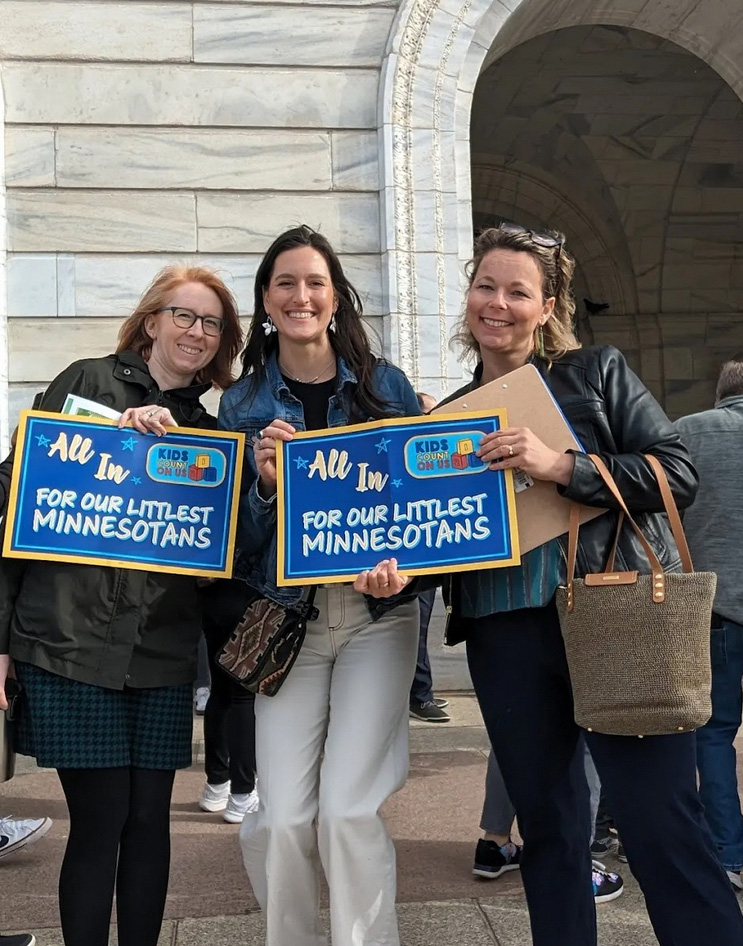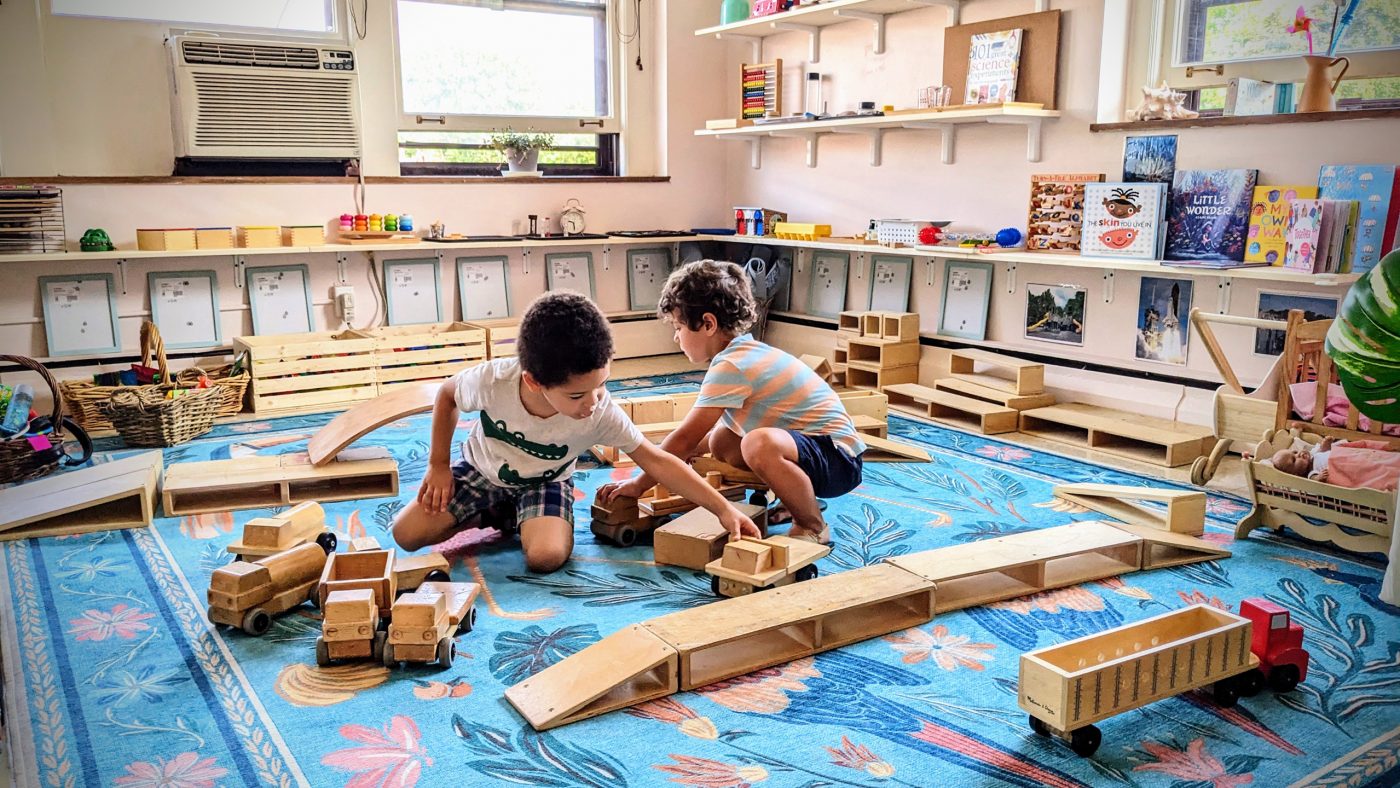Advocacy requires patience and persistence. And humility. Sometimes, all the organizing, letters to the editor and congressional testimony fall short. Sometimes, a breakthrough happens, but the time and effort of the people who made it possible get lost in the flurry of attention that follows.
Take Minnesota. The state is investing in child care and early learning in a big way, with more than $300 million in new spending and an additional $252 million for early learning scholarships. Later this year, it will launch a new Department of Children, Youth and Families, which will have a thousand employees. (Read more.)
👉 Minnesota Makes Major Strides on Behalf of Children and Families
The Minnesota policy breakthrough might not have happened without seven years of patient, persistent advocacy by Kids Count on Us, a coalition of 500 child care centers and an initiative of ISAIAH, a nonpartisan coalition of faith communities. While members come from different faiths and serve different types of communities, they have come together around common goals.
JaNaé Bates, ISAIAH’s interim co-director, says, “Years of organizing and advocacy paid off. ISAIAH leaders across the state held community conversations, roundtable events and candidate forums around the urgency and necessity to address our child care crisis. Parents, providers and educators organized together to imagine what kind of system is possible for Minnesota and what it would take to make it happen. Then, when Minnesota voters elected a Democratic House, Senate and Governor in November 2022, we were ready.”
Jennifer Wells, director of economic justice at Community Change, says, “Child care impacts everyone, no matter what they believe or where they come from. Because of our child care crisis and a lack of federal investment into our child care industry, states are having to get innovative to ensure providers’ doors stay open. Thanks to the power of community organizing, states are providing solutions and creating revenue sources to fund child care. These efforts are models of what we can be doing at the federal level.”
The Makings of a Better Society
Debra Messenger, the office manager of All Ages and Faces Academy in St. Paul and assistant pastor of True Vine New Bethel Baptist Church, has worked in child care for 24 years. She has seen up close how early education does more than get kids ready for kindergarten.
“This is the time of life when they develop the mindset to do their very best,” she explains. “They get that from the environment around them. Like the saying goes, ‘Some things can be taught and other things can be caught.’ And I just think it makes for a better society.”
Before Kids Count on Us, she says, the state’s child care sector lacked cohesion. “We didn’t know who was making the rules or how they came about,” she admits. “It was like floating in a big sea and not seeing where the boats are. But a group of us got together and started going down to the Capitol with our kids.”
Kids Count on Us gradually turned up the pressure and kept making noise so that legislators wouldn’t be able to ignore the issues—most critically, inadequate investment in early care and education.
An Essential Public Service

After founding Big Wonder Child Care in St. Paul last year, Celeste Finn felt isolated and run down. “I was fighting too many battles every day,” she recalls.
Finn notes that teachers are greatly respected in the Baha’i Faith. Service to the community is also prioritized, which is what led her to activism, but the stress of starting and operating a child care made it hard to find her voice. It didn’t help that family and friends doubted her career choice, telling her it wasn’t important enough, that it wasn’t even a respectable profession.
“But the research cemented what my heart was telling me,” she says. “If you want to make an impact on children’s lives, you need to work with them when they’re younger. That’s when the prefrontal cortex is developing and when their values and biases are developing—which is why child care deserves funding. It’s an essential public service.”
Finn discovered Kids Count on Us on Facebook. “So now instead of me having to do all this research and find all the bills, I have a framework to make it so much easier. Having a group like this is a salve. It’s a balm. It helps make me feel a little less alone, like change is possible.”
👉 We can have quality, affordable child care and pay a living wage, but we must have public funding (Celeste Finn in the Minnesota Reformer)
Bread and Peanut Butter
Messenger is happy about the policy wins, but she’s not content yet. There’s still a shortage of early educators in and around Minneapolis-St. Paul. “Right now,” she says, “They’re opening up a whole bunch of spots for children to get into, but without the workers, it’s like having bread but no peanut butter.”
She’s also concerned about regulations that impede entrepreneurship. “These rules that might look good on paper,” she contends, “but they take the joy and passion out of working with children. You’re scared to sneeze too loud because it might be against a statute.”
ISAIAH’s Bates sums up, “What we achieved during the 2023 legislative session for child care (and many other issues) did two really important things. First, Minnesotans across race, gender and background won policies that will materially and significantly improve their lives and well-being. And just as important, it demonstrated again that organizing works and unlocks even more possibilities for what Minnesotan families can have going forward. We’re already seeing that virtuous cycle unfold right now.”

Mark Swartz
Mark Swartz writes about efforts to improve early care and education as well as developments in the U.S. care economy. He lives in Maryland.



